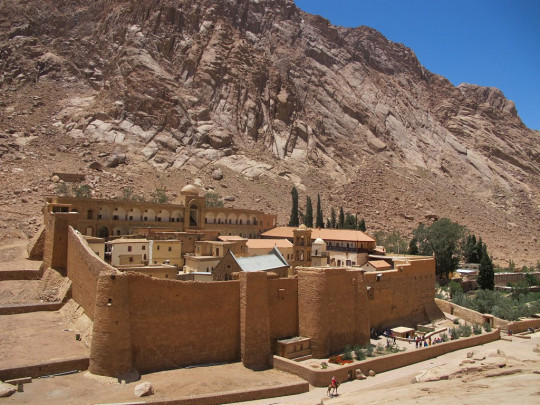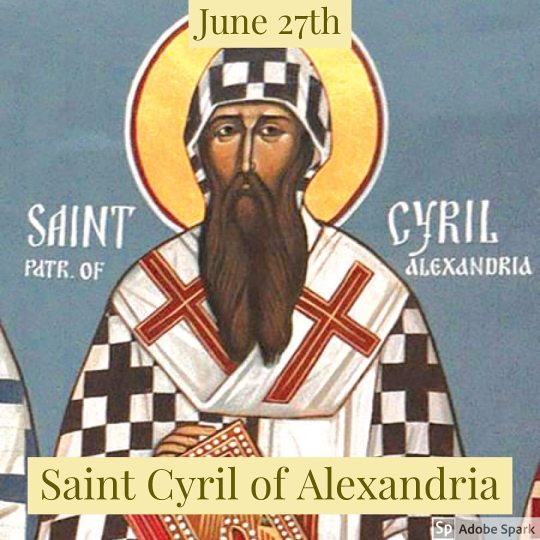#SaintCyril
Explore tagged Tumblr posts
Text

"…Hear my prayer and protect your faithful people, for you have established me as their unsuitable and unworthy servant…" - #SaintCyril #SaintoftheDay
📷 Praying Hands / © myshkovsky via #GettyImages. #Catholic_Priest #CatholicPriestMedia #PrayPeace
8 notes
·
View notes
Photo

Saint Cyril
Saint Cyril (aka Kyrillos and Constantine the Philosopher, d. 867 CE) was a Byzantine linguist, teacher, scholar and missionary who famously preached Christianity to the Slavs in Moravia with his brother Methodius during the 9th century CE. He created the Glagolitic alphabet, the forerunner to the Cyrillic alphabet that bears his name, and did much to spread the religion, art and culture of the Byzantine empire into central Europe.
Early Life
Cyril is the monastic name the saint chose near the end of his life but he was born Constantine, the son of a military officer called Leo stationed in Thessaloniki; his mother may have been a Slav. He was a gifted linguist from an early age and was sent to Constantinople to further his education and study such languages as Syriac and Hebrew. Looked after by the eunuch Theoktistos, Cyril was ordained as a priest and served as an official at the Hagia Sophia church where he developed a close relationship with the Patriarch of Constantinople, the bishop Photios. The brilliant scholar quickly became the bishop's librarian. Cyril became a teacher of philosophy at the Magnaura university in Constantinople where he gained the epithet “Constantine the Philosopher”.
Cyril was next sent on two diplomatic missions, the first to the Muslim court at Samarra and the second to the Khazars, a Turkic tribe in the Caucasus, c. 860 CE. According to Cyril's 9th century CE biography, attributed to one of his disciples, the scholar monk was enthusiastic for the opportunity to spread the Gospel:
If you command, lord, on such a mission I shall gladly go on foot and unshod, lacking all the Lord forbade Hi disciples to bring.' The emperor answered, saying,: 'Well spoken, were you to do this ! But bear in mind the imperial power and honour, and go honourably and with imperial help.
Life of Constantine (in Shepard, 315)
The trip, unfortunately, ended in failure if it had intended to convert the Khazars to Christianity as the Byzantines only managed to baptise around 200 of them. The Khazaria state eventually adopted Judaism instead. Cyril did bring back souvenirs, though, said to be the relics of the exiled 1st century CE Bishop of Rome, Saint Clement. His ambitions were not dampened either as he promptly set off of his own accord into the Crimea to spread his message to the heathen Phoullai people. It is likely Cyril was not any more popular there, though, especially when he chopped down their sacred oak tree.
Continue reading...
28 notes
·
View notes
Photo

Monachisme Byzantin
Le monachisme, c'est-à-dire le fait pour des individus de se consacrer à une vie ascétique dans un monastère �� des fins de dévotion, était une caractéristique omniprésente de l'empire byzantin. Les monastères devinrent de puissants propriétaires terriens et une voix très écoutée dans la politique impériale. Entre ascètes fanatiques et producteurs de vin très appréciés, les hommes et les femmes qui consacraient leur vie à la vie monastique constituaient une partie importante de la communauté. Les monastères offraient toutes sortes de services aux pauvres et aux nécessiteux, aux nobles en disgrâce, aux voyageurs fatigués et aux rats de bibliothèque avides de connaissances. De nombreux monastères byzantins sont encore en activité et leur architecture impressionnante embellit les paysages d'aujourd'hui, depuis Athènes jusqu'au Sinaï.
Lire la suite...
3 notes
·
View notes
Text
#QuiapoChurch 8PM #OnlineMass • 14 FEBRUARY 2025 Memorial of Sts. Cyril,...
0 notes
Photo

St. Cyril of Alexandria (376-444) was the Patriarch of Alexandria from 412 to 444. He was enthroned when the city was at the height of its influence and power within the Roman Empire. Cyril wrote extensively and was a leading protagonist in the Christological controversies of the late-4th and 5th centuries. He was a central figure in the Council of Ephesus in 431, which led to the deposition of Nestorius as Patriarch of Constantinople. Nestorius was preaching that Mary was not the Mother of God since Christ was Divine and not human, and consequently she should not have the word theotokos (God-bearer) applied to her. He persuaded Pope Celestine I to convoke a synod at Rome, which condemned Nestorius, and then did the same at his own synod in Alexandria. Cyril wrote treatises that clarified the doctrines of the Trinity and the Incarnation and that helped prevent Nestorianism and Pelagianism from taking long-term deep root in the Christian community. He was the most brilliant theologian of the Alexandrian tradition. His writings are characterized by accurate thinking, precise exposition, and great reasoning skills. Among his writings are commentaries on John, Luke, and the Pentateuch, treatises on dogmatic theology, and Apologia against Julian the Apostate, and letters and sermons. He was declared a doctor of the Church by Pope Leo XIII in 1882. - - - - - #stcyril #stcyrilofalexandria #saintcyrilofalexandria #saintcyril #theology #saint #saintoftheday #catholicmen #catholic #catholiclife #catholicism #catholicchurch #art #god #jesus #holy #holyspirit #religion #romancatholic #faith #pray #prayer #patronsaint #instacatholic #christianity #jesuschrist #blessed #alexandria #icon #orthodox https://www.instagram.com/p/CB8KZZ8hXmr/?igshid=1886owcy1f53y
#stcyril#stcyrilofalexandria#saintcyrilofalexandria#saintcyril#theology#saint#saintoftheday#catholicmen#catholic#catholiclife#catholicism#catholicchurch#art#god#jesus#holy#holyspirit#religion#romancatholic#faith#pray#prayer#patronsaint#instacatholic#christianity#jesuschrist#blessed#alexandria#icon#orthodox
0 notes
Note
'I think I'm falling for you'
Send me: 'I think I'm falling for you' to see how my muse reacts!
Shao blushed at those words, kissing Cyril's cheek before crouching on the ground with a soft smile on her lips.
"Cyril..." She whispered, slowly tracing a finger along the ground and looking back up at him before looking down again with apple red cheeks.
#saintcyril#ask#answered#valentine's meme#romance meme#falling in love meme#muse reaction meme#she's all blushing and trying to hide it from view!
7 notes
·
View notes
Text
Replies, replies and replies
So, I will be replying to the threads as soon as I can. School is making me busy again. So, stay awesome and carry on RPing!
0 notes
Photo

Bohemian Reformation
The Bohemian Reformation (c. 1380 to c. 1436) was the first concerted effort by Catholic clergy to reform the abuses and corruption of the medieval Church. Bohemian clerics and theologians called for reform and, like later advocates, initially had no intention of breaking with the Church until the martyrdom of Jan Hus in 1415.
Continue reading...
49 notes
·
View notes
Note
Fellow roleplayer appreciation time: it's time to tell some of your favorite blogs that you acknowledge, and appreciate their work; let them know that you love them. Spread the love to 10 of your favorite blogs. ♥
asjdagsdkjd THANK YOU!
I can't choose only 10 though so um...I LOVE ALL OF YOU SO MUCH!
0 notes
Note
‡ (childhood AU!!)
Send me ‡ for my character's reaction to yours climbing in the tub with mine.
"No!"
Cyril looked up and found his mother coming in with a struggling Shao, who was just as filthy as he was, both having been playing in the mud and rain earlier that day.
"I can bathe myself! I promise!"
"Come now, wouldn't you rather talk to Cyril as you wash up?"
"He needs privacy! As do I!"
Shao was settled into the wash basin, a pout on her face as she felt water being poured over her hair before she could dive out and run free naked.
The tiny boy lit up with a blush and quickly covered his manly bits as his mother did the same, washing both children in turn even though they were embarrassed to share the same tub.
If it got them both clean, so be it.
#saintcyril#ask#answered#reaction meme#muse reaction meme#bathing meme#childhood AU#poor cyril...#having to share the tub!
1 note
·
View note
Text
The Mun said all the replies will be done as soon as he can. And it's time for me to be in bed with him now (we're not doing that sexy thing, okay?). So, stay awesome. -- Ezio
2 notes
·
View notes
Text
saintcyril started following you
Have we met before? Those robes look familiar.
3 notes
·
View notes
Photo

Réforme de Bohême
La Réforme de Bohême (c. 1380 à c. 1436) fut le premier effort concerté du clergé catholique pour réformer les abus et la corruption de l'Église médiévale. Les ecclésiastiques et les théologiens de Bohême appelèrent à la réforme et, à l'instar des partisans ultérieurs, n'avaient initialement aucune intention de rompre avec l'Église jusqu'au martyre de Jan Hus en 1415.
Lire la suite...
1 note
·
View note
Note
✈
Who wants kisses? Drop me a symbol!
✈: A barrage of kisses all over your face.
They were quick, gentle and sweet, each kiss landing over Cyril's cheeks, nose, chin, forehead, and even over closed eyes! "Idiot! You fool! You could have died doing that!"
She didn't wish the death of a brother in arms, and a man who was like family to her!
#saintcyril#ask#answered#kissing meme#symbol meme#violent kissing symbol meme#let's say cyril tried a leap of faith#and scared the hell out of shao
20 notes
·
View notes